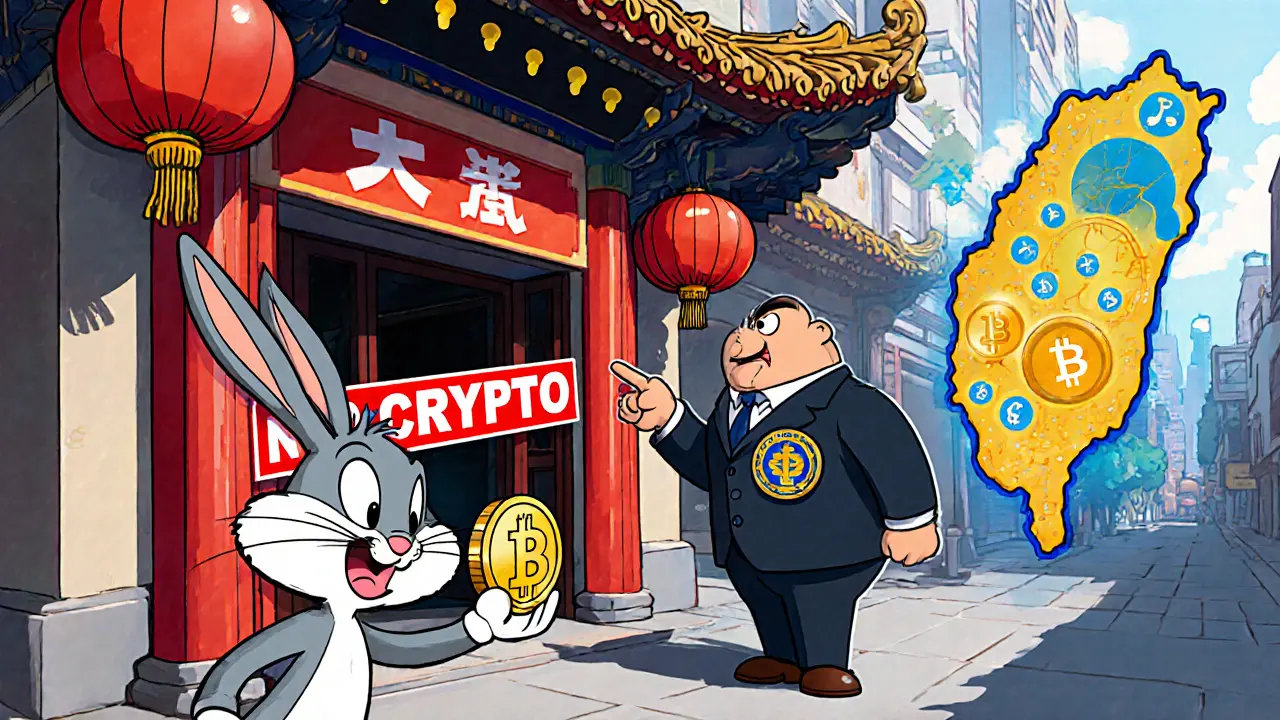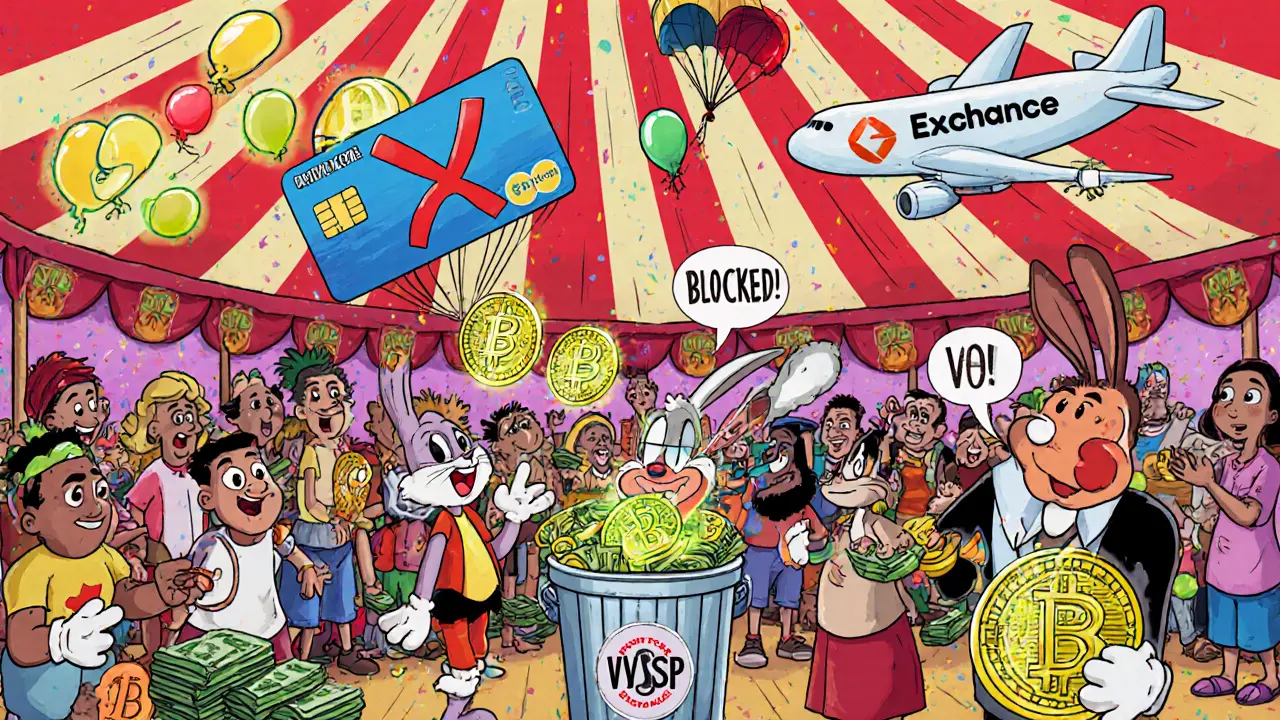Taiwan's Selective Banking Crypto Restrictions: What Investors Need to Know
 Oct, 25 2025
Oct, 25 2025
Taiwan Crypto Transaction Calculator
Estimate Your Crypto Transaction Costs in Taiwan
Based on Taiwan's banking restrictions and VASP registration requirements (as of late 2024)
Estimated Transaction Costs
Taiwan crypto regulation is a carefully balanced framework that allows people to own and trade digital assets while keeping traditional banks out of the crypto game. Since the Financial Supervisory Commission (FSC) first labeled Bitcoin a “highly speculative virtual commodity” back in 2013, the island has added layers of rules, fines, and even criminal penalties. If you’re a trader, an exchange founder, or just curious about how crypto works in Taiwan, this guide breaks down the key pieces you need to survive the banking ban and the new VASP registration regime.
How Taiwan Views Crypto
In Taiwan, the FSC and the Central Bank of the Republic of China (CBC) share the regulatory spotlight. Their joint stance treats most cryptocurrencies as virtual commodities, not legal tender. This means you can buy, hold, and sell them, but you cannot use them to pay for everyday goods the way you would with cash.
Two facts shape the landscape:
- Bitcoin and similar assets are classified as speculative, so they fall under the FSC’s commodity oversight.
- Security tokens are covered by the Securities and Exchange Act, which brings a whole different set of rules.
Because of this split, the government can tighten rules around banking without choking off the whole crypto market.
Banking Ban Explained
The FSC’s 2014 directive was crystal clear: local banks cannot accept Bitcoin, nor can they offer any service that helps turn fiat into crypto. The ban was reinforced in July 2022 when the FSC ordered the bankers’ association to block credit‑card transactions for crypto purchases, treating them like online gambling or prohibited futures contracts.
What does this look like on the ground?
- You won’t find a bank‑to‑exchange wire transfer option on most Taiwanese platforms.
- Credit‑card payments to crypto firms are blocked, forcing users to turn to peer‑to‑peer (P2P) deals or overseas exchanges that have a local VASP licence.
- Even payroll or vendor payments in crypto have to be routed through non‑bank channels, often via third‑party payment processors.
Compliance experts say this separation reduces money‑laundering risk, but crypto advocates argue it stalls innovation and makes everyday users jump through hoops.
VASP Registration Rules (Effective Jan 1 2025)
Virtual Asset Service Provider (VASP) is the term the FSC now uses for any business that offers crypto‑related services - exchanges, wallets, custodians, you name it. Starting January 1 2025, registration is mandatory, replacing the voluntary compliance model that began in 2021.
Key registration requirements:
- Submit an AML‑compliant policy vetted by the FSC.
- Implement asset segregation - customer funds must be kept separate from company accounts.
- Pass a cybersecurity audit that covers data protection and incident response.
- Maintain a local office and a dedicated compliance officer.
Failure to register can lead to fines up to NT$5 million (about US$155,900) and up to two years in prison.
As of late 2024, only 23 VASPs have cleared the registration hurdle. The biggest player, MaiCoin, handles roughly US$70 million in daily trading volume and is planning an IPO on the Taiwan Stock Exchange.

Impact on Users and Exchanges
For everyday traders, the banking ban means you’ll be using one of two workarounds:
- P2P platforms - You match with another user who can pay you in cash or via a local payment service, then you trade crypto directly.
- International exchanges with local VASP registration - Some overseas platforms have set up a registered subsidiary in Taiwan to stay compliant.
Reddit threads from r/Taiwan and r/cryptocurrency show that P2P trading is still the most common method, especially for smaller amounts. Users report an average satisfaction rating of 3.8 / 5 for local exchanges like MaiCoin, mainly because of the limited banking integration. International platforms score higher (around 4.2 / 5) but often charge higher fees.
From a business perspective, setting up a crypto firm in Taiwan now costs between NT$2‑5 million for compliance infrastructure, and the learning curve for navigating the banking rules can take three to six months.
Stablecoin and Future Outlook
June 2025 will bring a new draft law that targets stablecoins pegged to the New Taiwan Dollar (TWD). The FSC plans to allow regulated financial institutions to issue government‑backed stablecoins, essentially creating a “bank‑friendly” crypto that can sit inside the traditional system.
Why does this matter?
- It could be the first crack in the banking wall, letting regulated banks handle TWD‑backed stablecoins while still banning unregulated coins like USDC or USDT.
- Businesses that issue or use a government‑backed stablecoin would get a clear legal path, potentially lowering compliance costs.
Meanwhile, the Central Bank is testing a CBDC prototype with the Ministry of Digital Affairs. If the CBDC rolls out smoothly, the FSC might feel comfortable easing some restrictions for digital assets that are fully supervised.

Practical Checklist for Crypto Businesses in Taiwan
Whether you’re launching a new exchange or expanding an existing platform, here’s a quick cheat‑sheet to stay on the right side of the law:
- Register as a VASP before you start - Gather AML policies, hire a compliance officer, and set up asset segregation.
- Design your payment flow around the banking ban - Use third‑party processors, P2P gateways, or stablecoin solutions where allowed.
- Run a cybersecurity audit - The FSC expects proof of encryption, multi‑factor authentication, and incident response plans.
- Stay updated on stablecoin legislation - If you plan to issue a TWD‑linked token, align with the draft rules expected in June 2025.
- Engage with the Taiwan VASP Association - Their self‑regulatory standards can smooth the interpretation of banking rules.
Missing any of these steps can trigger hefty fines or even criminal charges, so treat compliance as a core product feature, not an afterthought.
Key Takeaways
Taiwan’s crypto regime walks a tightrope between encouraging digital‑asset innovation and protecting its financial system. The banking ban forces crypto firms to think outside traditional finance, while the mandatory VASP registration adds a layer of legitimacy. Upcoming stablecoin rules hint at a future where some digital assets can safely interact with banks, but for now the divide remains firm.
If you’re navigating this space, focus on solid AML processes, keep an eye on the stablecoin draft, and be ready to use non‑bank payment channels. With those bases covered, you’ll be able to trade, invest, or run a crypto business in Taiwan without tripping the regulators.
| Aspect | General Cryptocurrencies | Government‑Backed Stablecoins |
|---|---|---|
| Bank Interaction | Prohibited - no direct deposits or withdrawals | Allowed for regulated banks under new draft law |
| Regulatory Body | FSC (commodity oversight) | FSC + Central Bank oversight |
| Registration Requirement | Mandatory VASP registration | Mandatory VASP registration + banking licence |
| Consumer Protection | AML, asset segregation, cyber‑security | All of the above + deposit insurance possibility |
| Typical Use Cases | Speculative trading, P2P transfers | Payments, remittances, e‑commerce |
Can I use a Taiwanese bank to buy Bitcoin?
No. The FSC has banned banks from accepting Bitcoin or providing any service that converts fiat to crypto. You’ll need to use a VASP‑registered exchange and a non‑bank payment method.
What happens if a crypto business operates without VASP registration?
The FSC can levy fines up to NT$5 million and impose up to two years of imprisonment. The business will also be shut down and barred from operating in Taiwan.
Are stablecoins currently allowed in Taiwan?
Unregulated stablecoins like USDC are still treated as virtual commodities and face the same banking ban. However, a draft law expected in June 2025 will permit regulated financial institutions to issue government‑backed TWD‑stablecoins.
How do Taiwanese users typically fund their crypto accounts?
Most rely on peer‑to‑peer platforms, cash deposits via local agents, or international exchanges that have a VASP licence. Direct bank transfers are not an option.
Will the Central Bank Digital Currency (CBDC) affect the banking ban?
The CBDC is still in testing, but experts say a successful rollout could lead to a gradual easing of banking restrictions for government‑supervised digital assets, while speculative crypto will likely stay separate.
Claymore girl Claymoreanime
October 25, 2025 AT 08:33The banking ban in Taiwan essentially forces crypto firms to innovate beyond traditional finance, compelling them to adopt P2P solutions or partner with overseas exchanges that have secured VASP status. This approach, while cumbersome, actually cultivates a more resilient ecosystem that isn't overly dependent on legacy banking infrastructure. Moreover, the FSC's strict AML requirements create a de‑facto vetting process that weeds out shady operators early on. Investors who understand these nuances can navigate the landscape with considerably less friction. In short, the regulatory design aims to protect the financial system while still allowing genuine crypto activity to flourish.
Will Atkinson
October 25, 2025 AT 11:36Wow, what a detailed breakdown! 🎉 It’s fascinating how Taiwan’s regulators managed to walk that fine line-allowing crypto ownership but keeping banks out of the game. The VASP registration starting 2025 really raises the bar for compliance, which is great for user safety. For traders, the P2P work‑arounds might feel like extra steps, but they also open up a community‑driven market that’s surprisingly vibrant. Keep the updates coming, folks-this space evolves faster than a blockchain fork!
monica thomas
October 25, 2025 AT 15:46Esteemed colleagues, the provision of a dedicated compliance officer, as mandated by the FSC, is a cornerstone of the new VASP framework. It assures that anti‑money‑laundering protocols are uniformly enforced across all registered entities. Consequently, the risk of illicit fund flows is substantially mitigated, fostering greater confidence among institutional participants.
Edwin Davis
October 25, 2025 AT 19:06From an American perspective, the Taiwanese stance on crypto seems overly cautious, especially when neighboring economies are embracing digital assets more freely. The prohibition against banks handling Bitcoin essentially handicaps the market, stifling potential growth. With the global crypto economy expanding, such restrictions may render Taiwan less competitive.
emma bullivant
October 25, 2025 AT 22:43The intricacies of Taiwan's crypto regulatory environment present a fascinating case study in the balance between innovation and oversight. While the banking ban may appear restrictive at first glance, it serves a deeper purpose: shielding the traditional financial system from the volatility inherent to speculative digital assets. By defining cryptocurrencies as “highly speculative virtual commodities,” the FSC acknowledges their potential while simultaneously imposing safeguards.
One must consider the historical context. Back in 2013, when the FSC first labeled Bitcoin in such terms, the market was nascent and largely unregulated globally. This early classification has allowed the regulator to build a layered framework over the years, integrating AML policies, asset segregation mandates, and cyber‑security audits.
The mandatory VASP registration effective January 2025 further solidifies this trajectory. Registration not only legitimizes platforms but also creates a standardized set of expectations, reducing the asymmetry of information between users and service providers. This is particularly crucial in an environment where peer‑to‑peer trading dominates due to banking constraints.
However, the practical impact on everyday users cannot be ignored. The inability to deposit or withdraw fiat directly through banks forces traders to rely on third‑party processors or P2P channels, a process that can be both time‑consuming and fraught with trust issues. Yet, this very friction cultivates a community‑driven ecosystem where reputation and personal networks become valuable assets.
Looking ahead, the upcoming stablecoin legislation may serve as a bridge between the rigid banking ban and the burgeoning digital asset market. By allowing regulated institutions to issue government‑backed stablecoins, Taiwan could gradually integrate crypto into its financial fabric without compromising on security.
In sum, the Taiwanese regulatory model, while appearing restrictive, actually offers a measured pathway for sustainable crypto growth. It protects the macro‑financial system, encourages compliance, and lays groundwork for future innovations such as regulated stablecoins and possibly a central bank digital currency. For investors and entrepreneurs alike, understanding these nuances is essential to navigating the market effectively.
Karla Alcantara
October 26, 2025 AT 02:20Hey everyone, just wanted to say that despite the hurdles, there’s a real silver lining here! 🌟 The banking ban pushes us to think outside the box, which can spark truly innovative payment solutions. Plus, the VASP registration adds a layer of trust-users feel safer knowing there’s a compliance officer watching over operations. Keep sharing your experiences; together we can build a resilient community that thrives even under strict regulations.
Jessica Smith
October 26, 2025 AT 02:26Regulation is just a fancy word for control.
Petrina Baldwin
October 26, 2025 AT 03:33The ban is a roadblock but not a dead end.
Ralph Nicolay
October 26, 2025 AT 04:40It is noteworthy that the FSC’s approach mandates an AML policy, which must be vetted by the Commission prior to VASP registration. Such procedural rigor ensures that compliance is not merely perfunctory but embedded within operational frameworks.
sundar M
October 26, 2025 AT 07:26Indeed, the requirement for a local office and a dedicated compliance officer adds a layer of accountability that can be quite reassuring for users. It also means that firms need to invest in proper infrastructure, which may filter out less serious players from the market.
Nick Carey
October 26, 2025 AT 10:46Honestly, reading all these rules makes my head spin. Maybe just stick to buying on the big exchanges and ignore the local drama.
Sonu Singh
October 26, 2025 AT 14:23Hey bro, if you’re looking to jump in, start with a VASP that already has the licensing. They’ll have the P2P hookups and the compliance docs ready, so you don’t have to build everything from scratch. Also, keep an eye on the upcoming stablecoin draft – it could open up cheaper ways to move money.
Chris Houser
October 26, 2025 AT 18:33Team, let’s remember that the core objective here is risk mitigation. By enforcing asset segregation and cyber‑security audits, the regulator is essentially building a safety net that protects both the consumer and the broader financial ecosystem.
William Burns
October 26, 2025 AT 22:43While the formal language of the regulations can feel imposing, it also sets a clear benchmark. Companies that meet these standards not only avoid penalties but also gain credibility in the eyes of sophisticated investors.
Ashley Cecil
October 27, 2025 AT 02:53It is morally imperative that regulators enforce strict compliance to protect the unsuspecting public from the perils of unregulated digital assets. The penalties outlined are a necessary deterrent.
Anastasia Alamanou
October 27, 2025 AT 07:03From a mentorship perspective, the VASP framework offers a roadmap for newcomers. By focusing on AML policies, cyber‑security, and asset segregation, we can guide startups through the compliance maze efficiently.
John Dixon
October 27, 2025 AT 11:13Oh great, another set of bureaucratic hoops to jump through-because what the crypto world really needed was more paperwork!!!
Michael Hagerman
October 27, 2025 AT 15:23Yo, I get it, regs are a pain, but they keep the bad guys out. Plus, once the stablecoin law hits, we might actually see some legit banking integration.
Laura Herrelop
October 27, 2025 AT 19:33One could argue that the very existence of a banking ban hints at a deeper, perhaps hidden agenda to control the narrative around digital sovereignty. It's not hard to imagine a scenario where only state‑approved tokens are ever allowed to cross the banking threshold.
olufunmi ajibade
October 27, 2025 AT 23:43Interesting perspective-still, the data shows that user adoption rates remain solid despite these restrictions. That resilience suggests the community values the freedoms offered, even if the infrastructure is a bit more fragmented.